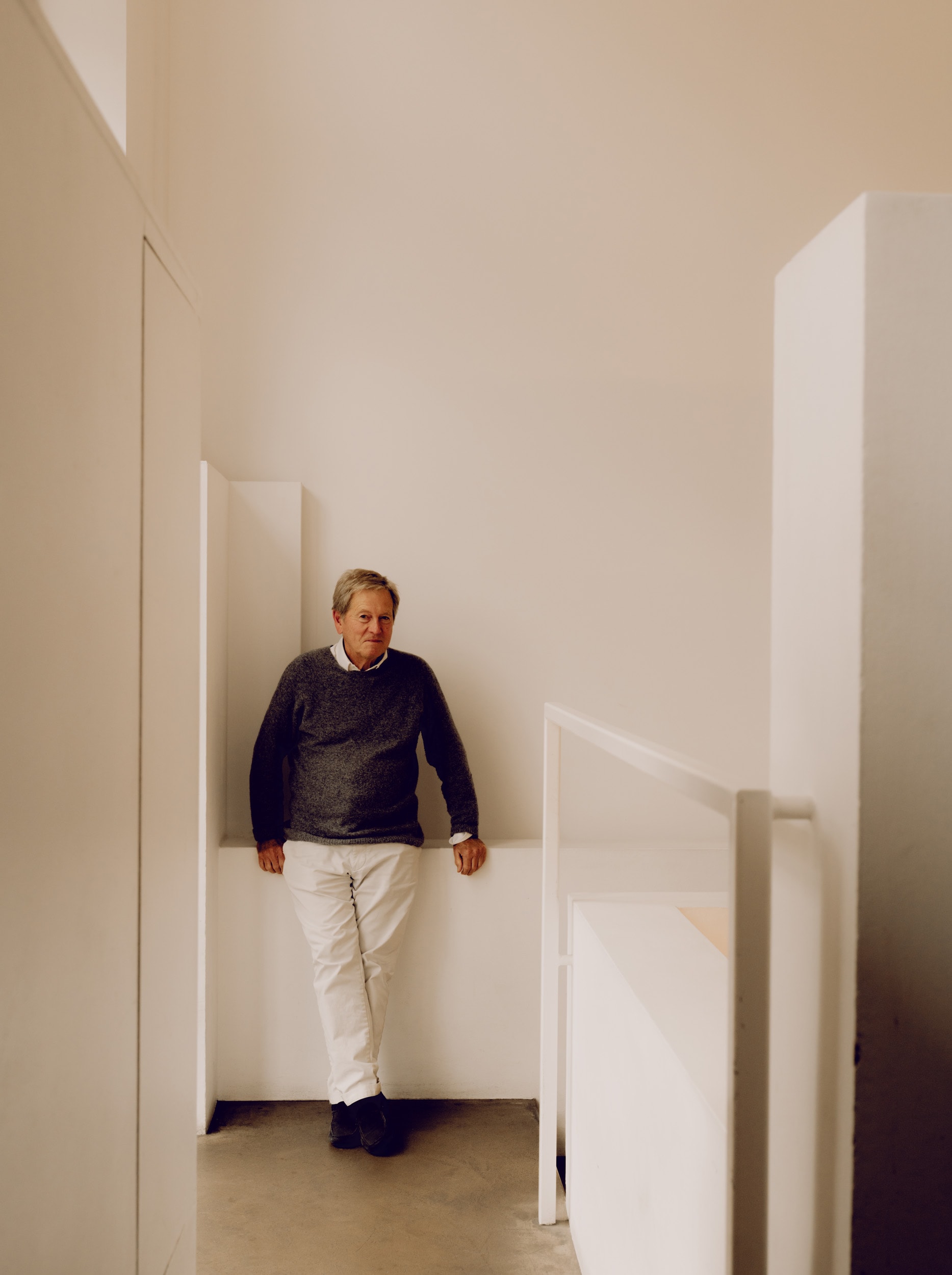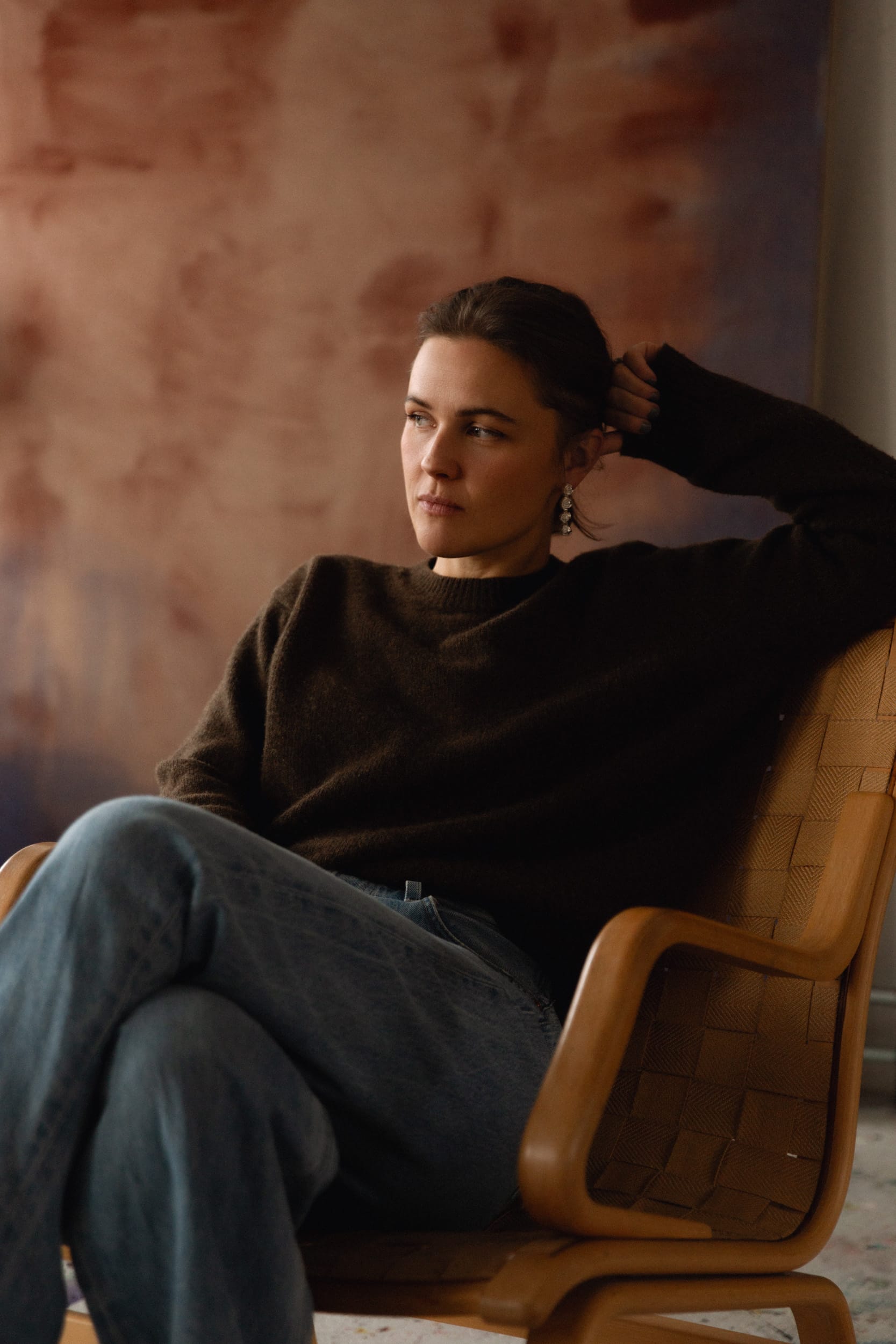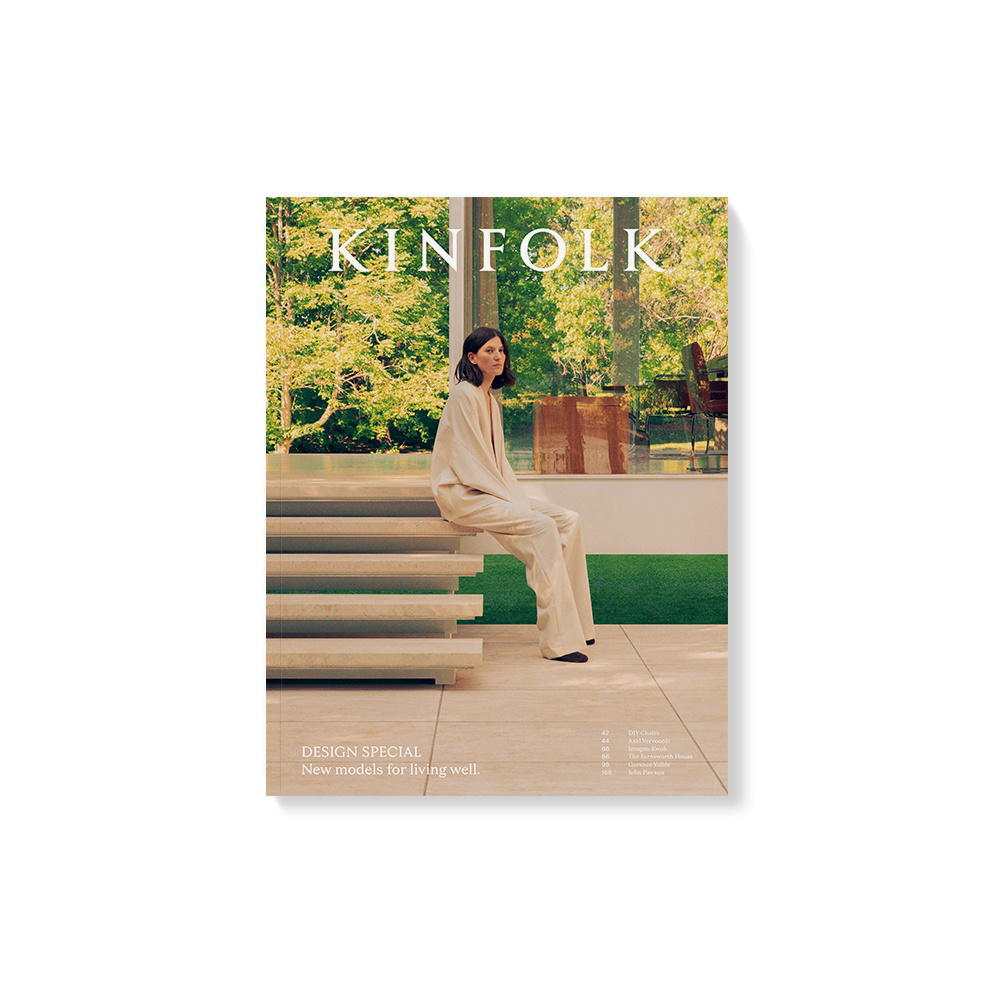Benjamin Clementine
The rise of a raconteur.

He wears COS head-to-toe.
Benjamin Clementine is a lesson in dichotomies: The 28-year-old pianist and songwriter exudes the wisdom of someone twice his age while questioning everything about the world around him with the vulnerability and naivety of a child. His songwriting is intensely personal, often dealing with themes of solitude and survival, and yet the artist himself is protective of the narrative surrounding his rise to fame. His story—of homelessness in Paris, attempted suicide, rags-to-riches discovery and success—is overly simplistic, he says. The truth is much murkier and more nuanced, as real-life stories so often are.
The youngest of five children, Clementine was raised by his grandmother in a middle-class household in Edmonton, London. She died when he was 11 years old, after which he was obliged to move in with his parents, who divorced when he was 16. At 19, he left London for Paris, where he began writing music and eking out a living busking in metro stations. We meet in Los Angeles as Clementine prepares to depart on a tour to promote his latest album, I Tell a Fly, a follow-up to his critically acclaimed debut, At Least for Now, which earned him the Mercury Music Prize in 2015. Wearing a suit with fur-lined Gucci mules, his Afro mimicking an intricately designed gentlemen’s hat, Clementine recounts his emotional inheritance and describes how, despite his worldwide acclaim, he still does not consider himself a singer.

Clementine wears a suit by Hermès, T-shirt by COS and his own Gucci shoes.
You spent some time living in New York recently. What was your impression? There were a lot of people and it was noisy. All the shops were trendy and the restaurants were expensive. Everyone was dressed fashionably. It was like Europe, and that’s not the America that I read about when I was a kid. That America was Albuquerque, Arizona and Texas.
Your song “Jupiter” feels like an immigrant’s tale. Is it based on personal experience? Americans like the word alien. I was called an “alien of extraordinary ability” on my visa and that was the first thing that made me go, “Wow. What the hell? An alien of extraordinary abilities? Okay, well I’m going to start making music. So be it, I’m going to be the alien.”


He wears a jacket by A.P.C. and sweater by COS.

Clementine wears a sweater by Dries Van Noten, T-shirt by COS and trousers by The Kooples.

Clementine wears a sweater by Dries Van Noten, T-shirt by COS, trousers by The Kooples and his own Gucci shoes.
“All I wanted to do was live and become myself. That was the dream for me.”
Your family is originally from Ghana? Well, that’s what they say.
What do you mean by that? It’s hard to talk about a country that I’ve never been to or had any affiliations with. My parents were immigrants who came to England. I’m not interested—it’s my father’s stuff. I was born in England. And if I can’t even build a relationship with my father, then why would I concern myself with where he came from? It’s a very complicated issue.
What’s your relationship like with your mother? It’s almost the same. I grew up with my grandmother and she was very young when she died. I only spent five years with my parents, between the ages of 11 and 16 before they divorced and left. I had to work for myself and find the meaning of life.
Do you think your early self-reliance has affected your work? People are always going to come against your ambitions, your dreams and what you want. We’re all human beings—that should be no surprise. But there’s beauty in everything. I think you should just go wherever you want to go. And if you want to stay, then stay. There’s always going to be someone who isn’t going to agree with what you think or what you believe in.
And where is it that you want to go next? I’m thinking about going to live in Albuquerque, New Mexico. When I moved to Paris, it was because I just felt that I had to go. I didn’t have money, but I found a way. I felt that I had something to do there. The reason I went to New York was that I felt I wanted to go to New York. I guess Albuquerque just feels like the next place. I would like to go there to possibly write.
Can you tell me a little bit about where you were in life when you wrote the song “Condolence”? I wrote that song when I had tried to commit suicide for the second time in Paris. Surviving those suicidal tendencies made me write that song. “If you cut yourself or if you jump off the bridge, would anyone care? Would anyone know?” I had realized that going away wouldn’t really make any difference to anyone. When I was in that process, I wrote a bunch of songs.
“All I wanted to do was live and become myself. That was the dream for me.”

Clementine wears a sweater by A.P.C. and trousers by COS.

He wears his own MM6 Maison Margiela suit.
What was your life like in Paris? In Paris, I was just a ghost. Right now, I’m paying taxes. I’ve got a house. I’ve got my name on it. But back then, no one knew who I was. I was a phantom. I was just trolling around the streets, talking to people.
Since then, you’ve performed around the world. How did you make it to Carnegie Hall? I believe that if you ask for money, you’ll only live for a day. I realized that I had to befriend people. Eventually, I started going to people’s birthday parties or they’d invite me to dinner. Friendship was the key to surviving. I could certainly compare that time in my life to the American dream—survival of the fittest.
What does the American dream mean to you now? Americans are free. Bringing that to what I went through a couple of years back, all I wanted to do was live and become myself. That was the dream for me—moving away to find your ground and be who you want to be. Believing in what you want, whether it’s a religion or a philosophy, being spiritual or living healthy, or just finding someone that you could love and cherish and care for. So, I guess now I’m doing whatever the so-called American dream is.
Your music has a deeply spiritual undertone to it. What role does religion play in your own life? I’m from a Roman Catholic family. My grandmother was very strict and so we went to church almost every day. I know that it’s such a powerful ingredient. I’ve taken principles that I’ve learned from the Bible, but I sincerely and graciously believe in love. After all of my traveling, my doubts and my battles, I just realized that all I wanted to do was to be loved and to love. That’s all I wanted. Of course, there will be money here and there. There will be attention. But truthfully, all I wanted was to be loved because possibly I wasn’t when I was a kid. So, I was searching for that. That’s what I think it’s all about.

Clementine wears a jacket and trousers by A.P.C. and a sweater by COS.

Clementine wears a coat and shirt by COS.
“I have things that I want to say, and this is the way that I want to say it.”
Your music doesn’t fit into any particular genre. It doesn’t follow a model for what’s right and what’s wrong, and there’s no following of a particular beat or rhythm. How would you describe it? What comes first is what I want to express. Earlier on in this conversation, we spoke about my father. After my grandmother died, there wasn’t a father figure in my life, or I didn’t really respect him. I never had that someone telling me to “Do this, do that.” Having had that experience, I find it very hard to listen to what someone—like my record label—has got to say about my music. I’ve followed my instincts and my intuition so much that I’m used to it now. That’s why my music sounds the way that it sounds. I have things that I want to say, and this is the way that I want to say it.
What sort of music did you listen to while growing up? I listened to classical music when I was a kid because my parents didn’t want me to listen to pop music. I could get away with classical music because there were no words. I like when music comes to me. I don’t like searching for it and searching for it. It’s like meeting somebody that you’ve fallen in love with. You don’t go around choosing their name. That’s how I see music.
I read that you learned to use your voice while busking. I still don’t believe that I’m a singer. Real singers for me are opera singers or contemporary singers like Beyoncé and Rihanna and all of those guys. I think I’m more of a speaker. I speak my mind, I speak what I write, and I try to find a sound that somehow accompanies it.
Your approach to performance is theatrical. How do you come up with these pieces? On my second album, I wanted to talk about matters of now—matters that concern me. I remember waking up in New York and seeing Clinton and Trump debating on a stage—like theater. I realized that if I’m going to talk about these sorts of things which are very, very important—you know, really impactful—I must make it really theatrical and make it more like a story so that people can just take it to wherever they want to take it. Music is all about play.
Where do you find your sartorial inspiration? It’s a bit like how I make my music. There are no rules. If it fits and I like it, I’ll just put it on whether it’s female or male. The first coat that I ever wore was from a rubbish bin in Paris. I wore it for about a year and a half. It looked horrible and was really dirty, but I didn’t care. If I didn’t have that coat, I would have gotten really cold. And the coat affected me somehow—the way I moved and the way I walked. It made me feel protected, like no one was going to hurt me. I think I’ve kept that. When I wear something, I want to feel protected.
What do you do for fun when you aren’t working on your music? I like to walk because it’s refreshing and makes you think. Most of my songs were made out of walking.
What’s your favorite meal? I like Italian food, and I can’t help but like New York steak and eggs. I had that yesterday morning.
Do you cook Italian food yourself? Yeah, I do. I like me some linguine.
I know you have to leave soon. Where are you headed to? I’m headed back to London, but I’m moving over here as soon as possible. At the very beginning of this conversation, you asked me where I’m from. It’s so confusing. Most of the time I’ll just say, “I’m from England.” But after being called an alien, I think that’s pretty much what I am. I could say I’m English-African or Franco-Anglo-African and all of that nonsense. In the simplest terms, I could quite possibly call myself an alien. I’m an alien, or so the American man thinks.
“I have things that I want to say, and this is the way that I want to say it.”

He wears a suit by Hermès and a top by COS.

Clementine wears his own MM6 Maison Margiela suit and Gucci shoes.



